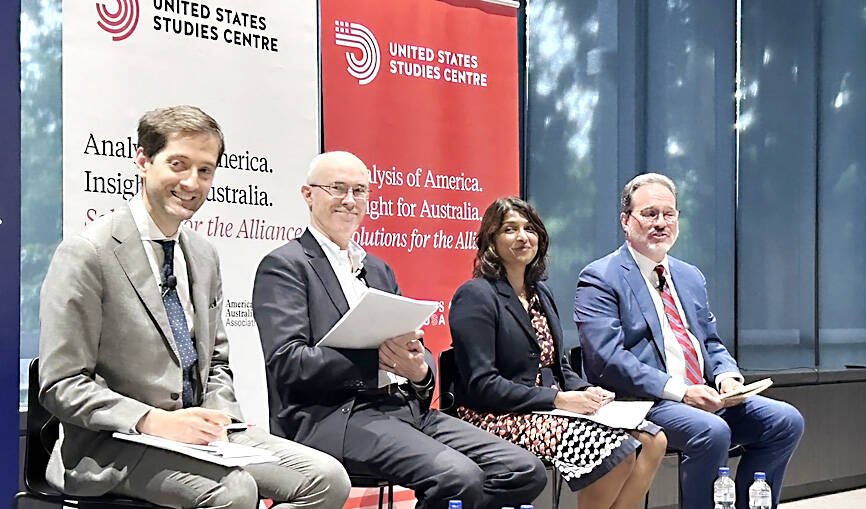Beijing would not give up its military aggression against Taiwan no matter which political party wins the presidential election next month, an Australian academic said on Thursday.
The University of Sydney’s US Studies Centre invited Australian and US academics to join a panel discussion on Taiwan’s presidential election, and its implications for Australia and beyond.
Richard McGregor, a senior fellow for East Asia at the Sydney-based Lowy Institute think tank, said that the presidential election is important, as it “represents the fundamental break between China and Taiwan.”

Photo: CNA
If the Democratic Progressive Party (DPP) wins the presidency again, it would “undoubtedly” provoke some kind of military response from Beijing, as Chinese officials and academics have told him, McGregor said.
While an invasion is unlikely, China might impose a blockade to “exhibit US impotence,” making the US “look like it’s losing its power and losing its grip,” he said.
If the Chinese Nationalist Party (KMT) wins, “there will be more carrots” from China, probably including lifting some trade embargoes, and increasing people-to-people and official exchanges, he said.
However, Beijing would not give up its “fundamental aim on unification,” meaning military exercises and coercion “will never go away,” he said.
Chinese President Xi Jinping (習近平) “has been quieter” prior to the election this time compared with the previous one in 2020, when he spoke about how “one country, two systems” in Hong Kong would apply to Taiwan, which backfired and might have contributed to the DPP’s victory, McGregor said.
Beijing has a variety of approaches to exert its influence, such as roping in Taiwanese officials to build grassroots support, economic coercion and disinformation campaigns, he said.
Former US National Security Council senior director for Asian affairs Michael Green said that the US is witnessing the highest-ever level of bipartisan support for Taipei and concern about what Beijing might do.
For Southeast Asian countries, they hope to maintain the “status quo” and avoid conflicts “at all costs,” so they are unlikely to take a strong position on Taiwan’s election, said Lavina Lee, a senior lecturer in Macquarie University’s Department of Security Studies and Criminology.
China has been attempting to “neutralize” Southeast Asian countries, preventing them from getting involved in a Taiwan contingency, Lee said, adding that the efforts have been “quite successful.”
Taiwan building “a strong, robust democracy in such a short period of time” from the ground up is “actually extremely remarkable,” she said, adding that the wishes of Taiwanese should be respected.
Taiwan has come a long way from being ruled by an authoritarian regime under martial law to becoming a beacon of democracy in the Asia-Pacific region, Representative to Australia Douglas Hsu (徐佑典) said.
Taiwanese are willing to do anything to safeguard their democracy, which was born of great sacrifice and is a “way of life,” Hsu said.
“This is our election. This is our democracy,” he said.
Hsu said he believes that whoever wins the presidential election would ensure that Taiwan continues to be a “resilient, free and democratic country,” as well as a responsible global stakeholder.

A relatively large earthquake may strike within the next two weeks, following a magnitude 5.2 temblor that shook Taitung County this morning, the Central Weather Administration (CWA) said. An earthquake struck at 8:18am today 10.2km west of Taitung County Hall in Taitung City at a relatively shallow depth of 6.5km, CWA data showed. The largest intensity of 4 was felt in Taitung and Pingtung counties, which received an alert notice, while areas north of Taichung did not feel any shaking, the CWA said. The earthquake was the result of the collision between the Philippine Plate and the Eurasian Plate, the agency said, adding

Snow fell in the mountainous areas of northern, central and eastern Taiwan in the early hours of yesterday, as cold air currents moved south. In the northern municipality of Taoyuan, snow started falling at about 6am in Fusing District (復興), district head Su Tso-hsi (蘇佐璽) said. By 10am, Lalashan National Forest Recreation Area, as well as Hualing (華陵), Sanguang (三光) and Gaoyi (高義) boroughs had seen snowfall, Su said. In central Taiwan, Shei-Pa National Park in Miaoli County and Hehuanshan National Forest Recreation Area in Nantou County saw snowfall of 5cm and 6cm respectively, by 10am, staff at the parks said. It began snowing

The 2025 Kaohsiung Wonderland–Winter Amusement Park event has teamed up with the Japanese manga series Chiikawa this year for its opening at Love River Bay yesterday, attracting more than 10,000 visitors, the city government said. Following the success of the “2024 Kaohsiung Wonderland” collaboration with a giant inflatable yellow duck installation designed by Dutch artist Florentijn Hofman, this year the Kaohsiung Tourism Bureau collaborated with Chiikawa by Japanese illustrator Nagano to present two giant inflatable characters. Two inflatable floats — the main character, Chiikwa, a white bear-like creature with round ears, and Hachiware, a white cat with a blue-tipped tail

HOLIDAY EXERCISE: National forest recreation areas from north to south offer travelers a wide choice of sights to connect with nature and enjoy its benefits Hiking is a good way to improve one’s health, the Forestry and Nature Conservation Agency said, as it released a list of national forest recreation areas that travelers can visit during the Lunar New Year holiday. Taking a green shower of phytoncides in the woods could boost one’s immunity system and metabolism, agency Director-General Lin Hwa-ching (林華慶) cited a Japanese study as saying. For people visiting northern Taiwan, Lin recommended the Dongyanshan National Forest Recreation Area in Taoyuan’s Fusing District (復興). Once an important plantation in the north, Dongyanshan (東眼山) has a number of historic monuments, he said. The area is broadly covered by